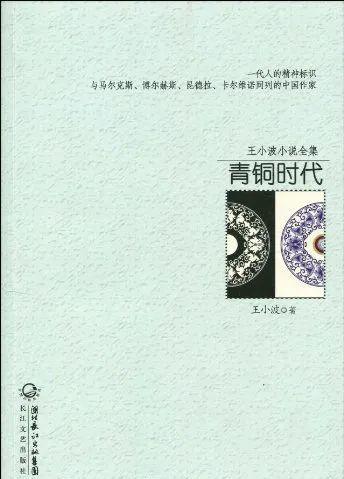
"Bronze Age" is a long collection of novels created by writer Wang Xiaobo, and is the third part of the "Times Trilogy".
"Bronze Age" consists of three parts: "Wanshou Temple", "Red Breeze Night Run" and "Looking for Peerless", which has both a labyrinth-like pattern and a charm that travels through time and space, the novel is humorous and interesting, but also rational, subverting the traditional moral myth and political myth through metaphorical stories and scenes.
Among the rewrites and parodies of the Chinese novel industry in the 1990s, Wang Xiaobo's "Wanshou Temple", "Red Breeze Night Run" and "Looking for Peerless" occupy an important position.
Synopsis
Xue Song in "Wanshou Temple" is a romantic and depressed knight, who left Chang'an and went to Xiangxi to establish his ideal "utopia", Phoenix Village.
When Li Jing in "Red Breeze Night Run" was young, in order to prove that he was clever, he continued to invent, and he also enjoyed the joy of wisdom in his own creations, but unexpectedly aroused the vigilance of the emperor, and the academic works could not be published publicly, so he had to hide the proof results of Fermat's theorem while drawing the Spring Palace diagram.
"In Search of The Peerless" tells the story of countless individuals involved in the memories and adaptations of history. In the text, Wang Xianke, who follows his own memory to Xuanyang Fang to look for Peerless, in the case that everyone unanimously denies the existence of Lu Wushuang or misleads his thinking, still decides to believe in himself and duel with the number of majorities, and finally finds the incomparable in his memory and confidence, and at the same time resurrects people's dusty memories while proving the existence of Peerless.
Creative background
The three stories of Wang Xiaobo's Bronze Age are all based on the Tang legend. The story of "Looking for Peerless" is derived from the Tang Dynasty Xue's "Peerless Biography", Wang Xiaobo intercepted the Peerless Entry into the Court as a model for the story of the previous part, focusing on the plot of Wang Xianke's search for Peerless, and adding the story of the death of the female Taoist Yu Xuanji in the middle. The legendary story of Yu Xuanji comes from the late Tang Dynasty Emperor FuMei's notebook novel "Three Water Calves". Even if you only look at the part of Wang Xianke's search for Peerless, compared with the original "Peerless Biography", there is no other relevance except that the main plot is roughly similar. "Red Breeze Night Run" is based on the Tang legend "The Biography of the Duke of Qiu Hair", and the author is Du Guangting. The original story was re-exaggerated in "Red Breeze Night Run", adding his own extremely rich imagination, including the bizarre depiction of Chang'an City. And added many plots after the original ending tang dynasty unification, Li Jingguan to servant shooting, Qiu Qigong entered the Buyeo kingdom, and killed his master after he established himself. Before wang Xiaobo wrote "Wanshou Temple", he rewrote Yuan Jiao's "Red Line" into a short story "Red Line Stealing Box", which was included in the novel collection "Tang Dynasty Stories". In the long story of "Wanshou Temple", the story in "Red Line" is basically only retained the two characters of the protagonist Xue Song and Red Line, and Wang Xiaobo has carried out a very free re-creation on this basis, whether it is the storyline or the relationship between the characters is very different from the original.
Evaluation of works
Liu Zhirong, professor of the Department of Chinese of Fudan University: The three novels in "The Bronze Age" are ostensibly in the Tang Dynasty, but they are obviously not historical novels, and all their inspirations are now, and the gray tone of the historical life written in his novels is the same as the gray and dark tone in real life, which is consistent, like the situation of Li Weigong in "Red Breeze Night Run" and the situation of mathematician Wang Er, the problems faced are actually consistent.
About the Author
Wang Xiaobo was born in 1952. A maverick writer. His works have been hailed as "the most beautiful harvest in contemporary Chinese literature". Since his death on April 11, 1997, his works have been widely read, concerned, and discussed, and have triggered the cultural phenomenon of "Wang Xiaobo Fever".
His major works include "Golden Age", "Silver Age", "Bronze Age", "My Spiritual Home", "Silent Majority", "Black Iron Age", and "Long Time". The collection of commemorative and commentary includes "Romantic Knight", "No More Silence", and "Wang Xiaobo's Painting Biography".